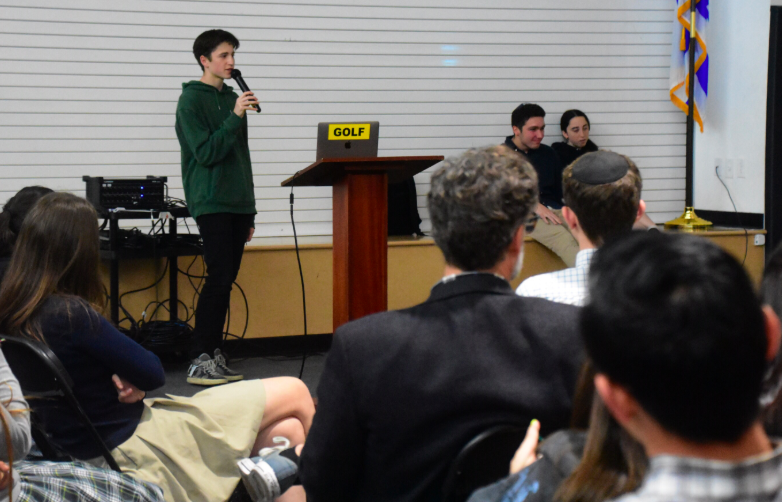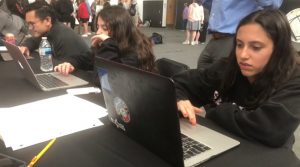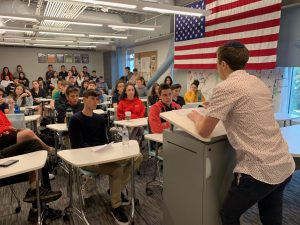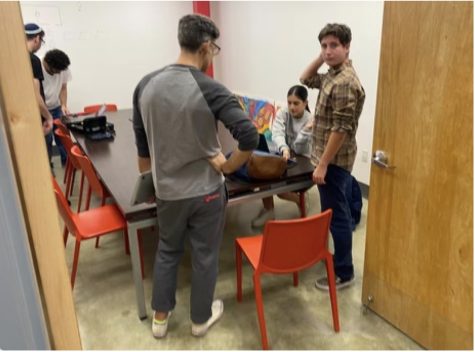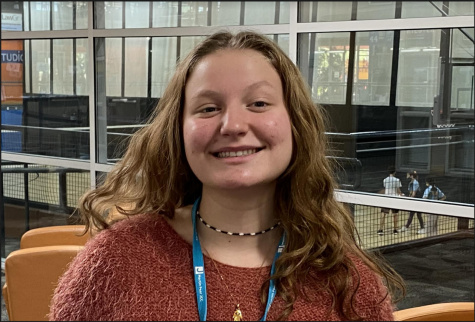‘Ranked Choice’ replaces ‘Instant Runoff’ as new election format in first Just Community decision this year
David Edwards is elected Agenda Chair, set proposal vote at his first Town Hall
ACTION: Leading his first Town Hall, newly elected Agenda Chair David Edwards introduced an Agenda Committee proposal for four different voting systems. A vote immediately after chose Ranked Voting as the new system.
In the first Town Hall led by the newly elected Agenda Committee, the community voted May 15 to institute a new “ranked choice” system of voting in future spring elections, replacing the current “instant runoff” system.
It was the first binding policy decision made by the Just Community this school year.
Incoming chair David Edwards, who led the meeting since seniors were in Poland, said the community urgently needed to vote on a proposal brought forward by the Agenda Committee to consider changing the school’s current system.
“Today we’re really trying to have progress within the Just Community,” said David, who was elected May 8 for next year. “The Agenda Committee is sorry that we didn’t properly explain the [old] voting system, and that it did not work as intended.”
It was the first Town Hall since part of this year’s election results were overturned May 10, after a problem with the instant runoff computer program caused a top vote-getter to lose the election for Fairness Co-chair. After a public hearing in Room 308, this year’s Fairness Committee voted to have three co-chairs for the next school year instead of two, so everyone who had been deemed a winner could serve.
At Town Hall, the Agenda Committee proposed four potential voting systems: instant runoff, simple plurality, approval voting, and ranked choice. “Ranked choice” won with almost 56 percent of the vote — 74 votes of 133 total cast, David said.
“Simple plurality” came in second with 35 percent (47 votes), while instant runoff finished third with six percent (eight votes). In an instant runoff system, second-place votes from the last-place candidate are added to other candidates’ tallies to determine a winner if no candidate receives 50 percent of the vote initially.
“Approval voting,” in which students vote for as many candidates as they like, came in last with three percent (four votes).
Once the systems were explained by David, the floor was opened up for a discussion. The Just Community — students, teachers and staff — voted right afterwards, from 12:30 to 1:30 p.m. David announced the results at 2:33 p.m. in a Schoology post.
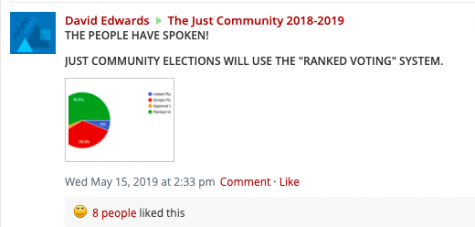 The ranked choice system was proposed by junior Zach Helfand, currently an 11th-grade Agenda representative. Under the system, voters rank each candidate from favorite to least favorite, and the winner is the candidate who was, on average, voted the highest.
The ranked choice system was proposed by junior Zach Helfand, currently an 11th-grade Agenda representative. Under the system, voters rank each candidate from favorite to least favorite, and the winner is the candidate who was, on average, voted the highest.
“This is the ultimate form, I’d say, of trying to see what is the popular opinion of everyone in the school,” David said during Town Hall.
At first, debate during Town Hall seemed to favor the re-institution of a simple plurality system, which had been used for most of school history. David opposed it, and said the Agenda Committee made a last-minute decision to include it.
“I thought it was a given that people realized how poorly it represents the most averagely-liked person in school,” David said.
But many speakers at Town Hall said they felt that the simple plurality system would be the easiest fix to a complicated voting system. Junior Gabby Lasry said she supported a simple plurality system, with voters voting for their favorite candidate, and whoever gets the most votes wins. In races with two winners, the top two vote-getters would be elected.
“I think we’re over-complicating things,” said Gabby. “I think it would be so much easier if everyone just votes for one person.”
Junior Noah Hertzberg said voting for more than one person, as in ranked and instant-runoff systems, isn’t logical.
“People actually are only concerned with their first place vote,” said Noah, who ran for Agenda Chair under the instant runoff system this year and lost. “For Agenda, no one’s actually concerned with their second and third choice… there’s only one Agenda chair option.”
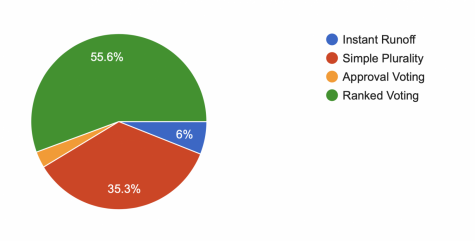 But once all options were introduced, sentiment seemed to shift.
But once all options were introduced, sentiment seemed to shift.
Junior Evan Rubel favored a voting system that would consider the overall sentiment of the Just Community.
“I really think it’s valuable, in terms of the instant runoff and ranked voting systems, that the people that are elected represent the consensus of the people,” said Evan.
Zach Helfand said a simple plurality vote could result in a generally unpopular candidate winning an election with a small percentage of the electorate.
“We shouldn’t be voting for someone that might be most-liked but not actually well liked amongst the distributed school,” Zach said.
He said the instant runoff system would be unreliable, and the approval voting system would be confusing and couldn’t reflect strong voting preferences.
Instead, Zach said he prefered a ranked voting system that he said would better reflect the overall opinion of the school.
“You get as much analysis and statistical data from the entire school,” Zach said. “You get the average.”
Freshman Noah Masliah worried the ranked voting system could still cause a candidate with the most second-place votes to overpower the first-place winner.
“It’s not fair, because it cancels out the one who actually had the most amount of votes,” Noah said.
Freshman Victory Fuchs said a system that preferred generally liked candidates could result in the election of fewer “bold” candidates.”
“If we have have a system in which the most average person wins every time,” said Victory, “then we’re not really going to have a lot of change in the Just Community.”
In the ranked choice system, voters rank their candidates from favorite to least favorite. The winner is then calculated by determining which candidate was overall ranked highest — on average, which candidate was ranked the most positively.
In the instant runoff system, if a candidate has not received a majority (50 percent) of the votes, then the second place votes of those who voted for the last place winner as their first choice are given to the candidate voted second as first place votes, until someone reaches 50 percent, and wins the race.
David said the hypothetical winner of the Fairness Co-chair race has not been determined using the ranked voting system instead of the instant runoff system. He was unsure if it would change the results.
He also said it could not be determined yet anyway, since the technical elements of the ranked voting system — like how valuable a first-place vote is compared to a second-place vote — are yet to be decided. The Just Community will be able to introduce proposals to decide the specifics, he said.
David defeated juniors Noah Hertzberg and Maya Tochner in the Agenda Chair election on May 7, which immediately followed an Agenda Chair debate that same day. The Just Community Constitution was a hot topic in the debate.
In an interview with the Boiling Point May 15, David said he would hold a Constitutional Convention next school year to rewrite the school’s Constitution, which was ratified in 2003 but has not been followed in recent years. It was lost from 2013 to 2016.
“I think it’s frankly ridiculous that we have a document we talk about so much at school, we say it represents our school, and we have it hanging on the wall,” David said, “but there are major inconsistencies with the way the school runs and the Constitution.
“I would even go so far as to say that there are more things in the Constitution that we don’t do [than] that we do.”
Next year, David said the Just Community should expect fewer and more relevant moral dilemma discussions, which constituted the majority of Town Halls this year.
“I would like to focus more on the Just Community and school-related things,” David said.
In an interview after the voting system Town Hall, he said binding proposals and voting in Town Halls will happen more often.
“I want to make sure that the Just Community is active and not just an idea that we talk about from time to time,” David said.
“I want to be voting on things, and making sure there is no separation between the student body and the Agenda Committee.”
Get the latest from The Boiling Point. Sign up for our news feed.
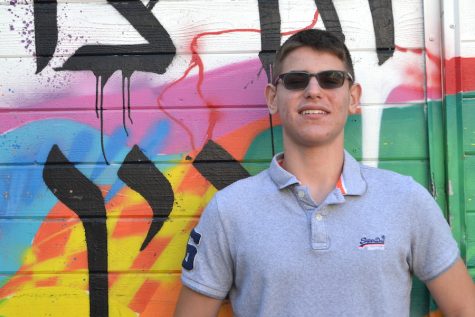
Alex joined the Boiling Point as a staff writer in his sophomore year, rose to Sports Editor in his junior year and is serving as both Sports Editor and Senior Editor this year. Aside from journalism, Alex loves playing and watching sports, flying planes and following the stock market.

